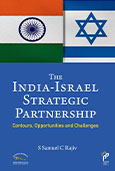You are here
The India-Israel Strategic Partnership

About The Book
India and Israel marked three decades of the establishment of full diplomatic ties in January 2022. In the aftermath of the historic visit of Prime Minister Narendra Modi to Israel in July 2017, India-Israel relations have acquired a new momentum and strategic depth.
Defence and security cooperation have been the mainstays of the partnership. The study notes that India is taking a series of measures to enhance domestic procurement and defence indigenization. Going forward, strategic partners like Israel will be expected to continue to work more closely with the domestic defence industry to fulfil the critical requirements of India’s armed forces.
On reginal security issues like the Iranian nuclear contentions, India has adopted positions largely in opposition to the preferred Israeli policy preferences. India has, however, consistently held that it is opposed to the possibility of a nuclear Iran, given the negative repercussions for regional security and stability, as well as due to the Iran-Pakistan proliferation linkages.
India’s Palestine policy, meanwhile, will continue to be guided by its core principles on the issue, even as the possibility of an independent Palestinian state, living side by side with Israel, looks difficult to materialize in the near to mid-terms. This is even as the schisms within the Palestinian national movement look set to expand in the post-Mahmoud Abbas era.
The book brings to attention the dynamic path India-Israel relations have traversed in the past three decades, encompassing areas of defence and security and high-technology cooperation. New vistas of engagement are being pursued by both countries, bilaterally as well as with other countries. The first I2U2 Summit meeting held between the leaders of India, Israel, the UAE and the US in July 2022 emphasized the geo-economic focus of the unique mini-lateral group. An India-Israel enhanced strategic partnership is a win-win proposition, bilaterally and across regions.
About The Author
Dr S Samuel C Rajiv is Associate Fellow at the Manohar Parrikar Institute for Defence Studies and Analyses (MP-IDSA). He has published on issues related to India's foreign and security policies in Strategic Analysis, Foreign Policy, Business Standard, The Jerusalem Post, among other publications. Rajiv is a recipient of the President MP-IDSA's Award for Excellence for Young Scholars in 2013, 2014 and 2017, and is a member of the MP-IDSA website editorial team, since 2016. He earned his PhD from the School of International Studies, JNU, in 2021.
Contents
Acknowledgements
- Introduction: Strengthened Partnership Post-2014
- Defence Cooperation
Contours of Cooperation
Institutional Interactions and Military Exercises
Enablers for Defence Cooperation
Critics of the Defence Relationship
Defence Joint Ventures
Indian Defence and Aerospace Exports to Israel
The Atmanirbhar Bharat Abhiyan
Srijan Defence Indigenization Portal - Internal Security and Border Security Cooperation
Israel and Counter-terrorism
India-Israel Internal Security/Counter-terror Cooperation - High-Technology Cooperation
Innovation Sector Cooperation
Agriculture Sector Cooperation
Water Sector Cooperation
Space Cooperation - The Iran Challenge
Israel and the Iranian Nuclear Contentions
India and the Iranian Nuclear Contentions
Israel-Iran Geo-Strategic Rivalry: Responses and Implications for India - The Palestine De-Hyphenation
- Going Forward
Appendix
Index
Chapter Tables
- Annual Import Value of Equipment and Projected Requirement from Israeli OEMs (2017-26)
- Israel’s Kinetic and Non-Kinetic Responses to Terror Threats
- India-Israel Agricultural Project: State Projects and Amount Spent
- India-Iran Oil Trade 2010-22
- India-Iran Bilateral Trade 2010-21
Appendix Tables
- India-Israel Memorandum of Understandings (2014-2022)
- India-Palestine Memorandum of Understandings (2014-2022)
- India-Israel Defence Procurement Deals (2014-2022)
- India-Israel Joint Development Programmes (Missiles)
- India-Israel Defence Joint Ventures
- Port Visits of Indian Naval Ships to Haifa
- Key Institutional Interactions (2014-2022)
- Visits of Service Chiefs (2014-2022)
- High-Level Visits (2014-22)
- India-Israel Bilateral Trade 2012-22


